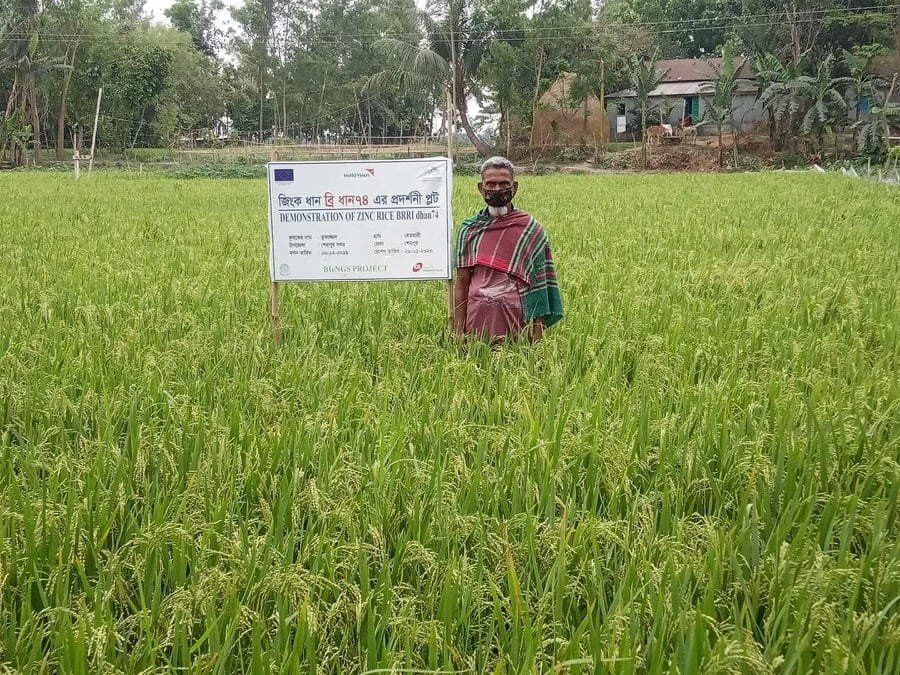Muhammad Abdul Razzak, a farmer living in Uthmerchar, a village in the Jamalpur district of Bangladesh, was worried about his crops. Due to the COVID-19 pandemic, the Bangladeshi government imposed a nationwide lockdown and instructed everyone to stay at home to curtail the spread of the virus.
Having worked hard on producing zinc-biofortified rice on his land, it was time to prepare for the harvest. Razzak needed to work in his rice fields or risk losing all of his harvest. During the lockdown, Razzak managed to get to the field and was dismayed to see that the developing crops were already affected by insects. He did not know how to address the infestation or how to procure any necessary insecticide.
He consulted with Billal Hossain, a Community Extension Facilitator with the Bangladesh Initiative to Enhance Nutrition Security and Governance (BIeNGS) Project, which is led by World Vision, with HarvestPlus as one of the project partners.
Razzak shared his crop’s condition with Hossain, who promptly made a phone call to the Community Extension Supervisor of the BIeNGS project and got the prescribed name of an insecticide and doses for the plot area. Hossain also told Razzak that agricultural inputs and other needed services were available from a specific shop which remained open during the lockdown, and Razzak could find the insecticide there. Under the circumstances, the farmers would not have been able to get the information they needed without the timely technical support provided by the project.
In Bangladesh, at the onset of the COVID-19 outbreak, there has been a significant impact on the food supply chain, which is a complex web of producers, input suppliers, processors, storage centers, transporters, marketers, and consumers. The government decided to ensure an uninterrupted supply chain for agricultural inputs amid the COVID-19 lockdown, allowing all agricultural input shops to remain open at specific times to support farmers. Thanks to this policy, Razzak was able to get what he needed to save his rice harvest.
A Pro-Agriculture Policy Response
The Prime Minister of Bangladesh, Sheikh Hasina, issued a directive for addressing the COVID-19 situation in the country, which included guidance that the “food production system will have to continue, and a greater variety of crops will have to be produced. Whatever is needed for food security, will have to be done and no land should be kept uncultivated.”
The directive added that the supply system for agricultural production should be maintained, while production, supply, and marketing of “essential goods” would be monitored. “The farmers will continue cultivation regularly, and in this case, government incentives will go on,” the directive notes.
The Prime Minister also unveiled a BDT 50 billion (USD 590 million) stimulus package with a 4 percent discounted interest rate on loans for the farmers who are being affected severely by the ongoing lockdown.
The Honorable Minister of Agriculture, Dr. Muhammad Abdur Razzaque, aired his video message for the Bangladeshi people: “We want to ensure that the Government will take all the necessary initiatives for continuous crop production. We want to assure you that agricultural inputs like fertilizer, seed, pesticide, electricity, irrigation water, etc., all supply will be uninterrupted in this COVID-19 situation.”
The Secretary of Ministry of Agriculture sent guidelines for his field officers stating that they must “stay in workstations and execute the government order. Stay with the farmers, stay beside the farmers”.
In the same vein, the Director General of Department of Agricultural Extension (DAE), Dr. Muhammad Abdul Muyeed, told the New Age that the government decided to ensure an uninterrupted supply chain for agricultural inputs amid COVID-19 lockdown.
He said: “Transports loaded with fertilizers, pesticides, diesel and other agricultural products would remain out of the purview of the transport ban.” He added that the necessary government directives had already been issued in this regard. He mentioned that farmers were provided mobile phone numbers of the local DAE officials so that they could be in touch with them in this difficult time.
He also said, “We are going to review all our agricultural production plans considering the COVID-19 pandemic to keep our food production and supply unhampered.”
Minimizing the Risk From COVID-19
During the current Boro (irrigated) season that is being harvested, HarvestPlus and its partners facilitated the sale of 437 metric tons (MT) of zinc rice through public and private seed companies. It is expected that Bangladesh will reap more than 100,000 MT in zinc rice production, from which around 70,000 MT of zinc rice grain will be produced, adding extra nutrition to the food plates of Bangladeshis.
It is with the determined support of the government and the tireless efforts of smallholder farmers like Razzak, that the nutritious biofortified zinc rice will be available for consumption which will increase the immunity at certain level of Bangladeshi people.
Note: The countrywide lockdown ended on 31 May 2020 but there are reports that the government plans to reimpose it.
